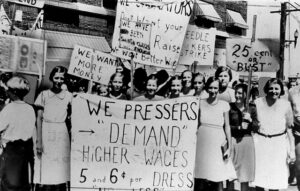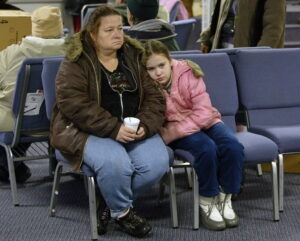- Work-Family Stressors, Gender, and Mental Health during COVID-19 and BeyondA briefing paper prepared by Daniel L. Carson, University of Utah, and Melissa A. Milkie, University of Toronto, for the Council on Contemporary Families symposium The COVID-19 Pandemic and the… Read more: Work-Family Stressors, Gender, and Mental Health during COVID-19 and Beyond
- Leave Laws Support EquityA briefing paper prepared by Jeff Hayes, Women’s Bureau, U.S. Department of Labor[1], and H. Elizabeth Peters, Urban Institute, for the Council on Contemporary Families symposium The COVID-19 Pandemic and… Read more: Leave Laws Support Equity
- Dads Home with Kids Peaked During The COVID-19 Pandemic – But Not for The Reason You ThinkA briefing paper prepared by Arielle Kuperberg, University of North Carolina – Greensboro, Sarah Thébaud, University of California, Santa Barbara, Kathleen Gerson, New York University, and Brad Harrington, Boston College,… Read more: Dads Home with Kids Peaked During The COVID-19 Pandemic – But Not for The Reason You Think
- Childcare Challenges During the Pandemic and Their Impact on Parents and Care ProvidersA briefing paper prepared by Liana Christin Landivar, Women’s Bureau, U.S. Department of Labor, and Pilar Gonalons-Pons, University of Pennsylvania for the Council on Contemporary Families online symposium The COVID-19… Read more: Childcare Challenges During the Pandemic and Their Impact on Parents and Care Providers
- Executive Summary: The COVID-19 Pandemic and the Future of Gender EqualityPrepared by Daniel L. Carlson, University of Utah, and Richard J. Petts, Ball State University, for the Council on Contemporary Families symposium The COVID-19 Pandemic and the Future of Gender… Read more: Executive Summary: The COVID-19 Pandemic and the Future of Gender Equality
- The COVID-19 Pandemic and the Future of Gender Equality SymposiumA new CCF symposium highlights what emerging research tells us about changes to family & work life during the COVID-19 pandemic and what they mean for the future of gender equality in the U.S.
- Best for Whom? Breastfeeding and Child DevelopmentIn a new brief report from CCF, Jessica Su finds that breastfeeding benefits are modest, and reach some children more than others
- Mothers Are the Primary Earners in Growing Numbers of Families with ChildrenA new study estimates that about 70% of U.S. moms can expect to be primary financial providers before their children turn 18.
- CCF Experts Kuperberg and Mazelis’ Student Loan Debt Brief Report Featured on North Carolina Public RadioRead more here: https://www.wunc.org/2021-04-12/what-would-you-do-without-student-debt-a-study-from-unc-greensboro-put-the-question-to-recent-graduates/ Also, check out this feature in Rutgers-Camden News Now: https://news.camden.rutgers.edu/2021/04/additional-student-loan-debt-cancellations-needed-says-sociologist/ Tweet
- The Difference Debt Makes: College Students and Grads on How Student Debt Affects Their Life ChoicesA new study explores the wide-ranging effects of student loan debt on young adults – and what they would do if they were forgiven.
- “The Tool We Have”: Why Child Protective Services Investigates So Many Families and How Even Good Intentions BackfireA briefing paper prepared by Kelley Fong from the Georgia Institute of Technology.
- Long-term Risks to Children from Economic Toll of COVID-19Although children appear to be less vulnerable than adults to serious COVID-19 medical complications, new data from the U.S. Census Bureau indicate that they are disproportionately endangered by the pandemic’s economic toll.
- New MAST Center Brief on Trends in Relationship Formation and StabilityThe Marriage Strengthening Research & Dissemination Center (MAST) recently released a new research brief, “Trends in Relationship Formation and Stability in the United States: Dating, Cohabitation, Marriage, and Divorce.” Co-authored… Read more: New MAST Center Brief on Trends in Relationship Formation and Stability
- Challenges Facing Cohabiting Couples Differ from those of Married Couples in this CrisisA briefing paper prepared by Amanda Miller, University of Indianapolis, and Sharon Sassler, Cornell University, for the Council on Contemporary Families. Much has been written about the challenges couples face… Read more: Challenges Facing Cohabiting Couples Differ from those of Married Couples in this Crisis
- When “Helicopters” Go to School: Who Gets Rescued and Who Gets Left Behind?When “Helicopters” Go to School: Who Gets Rescued and Who Gets Left Behind? A briefing paper prepared by Jessica McCrory Calarco, Indiana University, for the Council on Contemporary Families. We’ve… Read more: When “Helicopters” Go to School: Who Gets Rescued and Who Gets Left Behind?
- 10 Scary Facts About Child PovertyOctober 28, 2019 A fact sheet prepared for the Council on Contemporary Families by Dr. Jennifer Glass, Executive Director, Council on Contemporary Families and Professor of Sociology, University of Texas… Read more: 10 Scary Facts About Child Poverty
- Defining Consent SymposiumDefining Consent takes an unflinching look at the thorny question, what should count as consent to sexual activity – and what should not? In the process, scholars document how to hard it is to define consent or even sexual activity in a college setting.
- CCF’s Stephanie Coontz on Paying Stay-at-Home Parents in The New York TimesIn a recent article for the New York Times, CCF Director of Research and Public Education Stephanie Coontz discusses the potential implications of paying stay-at-home parents, a role most often… Read more: CCF’s Stephanie Coontz on Paying Stay-at-Home Parents in The New York Times
- Parents Can’t Go It Alone–They Never Have: What to Do for Parents to Help Our Next GenerationParents Can’t Go It Alone introduces you to important new work about what parents need to meet their goals and successfully raise the next generation.
- Why No One Can “Have It All” and What to Do About ItA briefing paper prepared by Kathleen Gerson, New York University, for the Council on Contemporary Families’ Symposium Parents Can’t Go It Alone—They Never Have. If debates about women’s rights, relationships… Read more: Why No One Can “Have It All” and What to Do About It
- Work that Works for Low-Wage WorkersA briefing paper prepared by Maureen Perry-Jenkins, the University of Massachusetts, Amherst, for the Council on Contemporary Families’ Symposium Parents Can’t Go It Alone—They Never Have. Low-wage jobs may not… Read more: Work that Works for Low-Wage Workers
- New from CCF: Even Gender Inequality is UnequalFOR IMMEDIATE RELEASE CONTACT: Virginia Rutter / Sociology @ Framingham State University vrutter@gmail.com Sociologist Jill Yavorsky conducted a field audit on gender discrimination in hiring and shares this early exclusive… Read more: New from CCF: Even Gender Inequality is Unequal
- Hiring-related Discrimination: Sexist Beliefs and Expectations Hurt both Women’s and Men’s Career OptionsHiring-related Discrimination: Sexist Beliefs and Expectations Hurt both Women’s and Men’s Career Options A briefing paper prepared for the Council on Contemporary Families by Jill Yavorsky, Assistant Professor of Sociology… Read more: Hiring-related Discrimination: Sexist Beliefs and Expectations Hurt both Women’s and Men’s Career Options
- Three Q: Per Coontz, Equality Is an agenda for all working people, not just feminists.3q: Per Coontz, Equality is an Agenda for All Working People, Not Just Feminists Virginia Rutter interviews Stephanie Coontz on the new Council on Contemporary Families brief, Hiring-related Discrimination: Sexist… Read more: Three Q: Per Coontz, Equality Is an agenda for all working people, not just feminists.
- Who Goes to Jail for Child Support Debt?A Research Brief Prepared for the University of Texas at Austin Population Research Center Research Brief Series Elizabeth Cozzolino Introduction Child support enforcement aims to increase child well-being by ensuring that… Read more: Who Goes to Jail for Child Support Debt?
- Community College Students Want to Use More Effective Birth Control Methods But Can’t Always Get What They WantA Research Brief Prepared for the University of Texas at Austin Population Research Center Research Brief Series Download a PDF of the Brief Kristine Hopkins, Celia Hubert, Kate Coleman-Minahan, Amanda… Read more: Community College Students Want to Use More Effective Birth Control Methods But Can’t Always Get What They Want
- The Impact of Information about Abortion Safety on Texas Voters’ Opinions about Restrictive LawsA Research Brief Prepared for the University of Texas at Austin Population Research Center Research Brief Series Download a PDF of the Brief Kari White, Daniel Grossman, Amanda Jean Stevenson, Kristine… Read more: The Impact of Information about Abortion Safety on Texas Voters’ Opinions about Restrictive Laws
- The Impact of the Zika Epidemic on Women’s Reproductive Intentions and Behaviors in BrazilA Research Brief Prepared for the University of Texas at Austin Population Research Center Research Brief Series Download a PDF of the Brief Letícia J. Marteleto, Abigail Weitzman, Raquel Zanatta… Read more: The Impact of the Zika Epidemic on Women’s Reproductive Intentions and Behaviors in Brazil
- What are the Effects of Mothers’ and Fathers’ Depression and Thoughts of Death on Their Children’s Level of Parental Connectedness?A Research Brief Prepared for the University of Texas at Austin Population Research Center Research Brief Series Susan De Luca, Yan Yueqi, and Yolanda Padilla Introduction Mental health outcomes such… Read more: What are the Effects of Mothers’ and Fathers’ Depression and Thoughts of Death on Their Children’s Level of Parental Connectedness?
- Improving Women’s Education Improves Maternal Health: Evidence from PeruA Research Brief Prepared for the University of Texas at Austin Population Research Center Research Brief Series Download a PDF of the Brief Abigail Weitzman Introduction Maternal mortality in Peru declined… Read more: Improving Women’s Education Improves Maternal Health: Evidence from Peru
- How Greater Travel Distance Due to Clinic Closures Reduced Access to Abortion in TexasA Research Brief Prepared for the University of Texas at Austin Population Research Center Research Brief Series Download a PDF of the Brief Daniel Grossman, Kari White, Kristine Hopkins, and Joseph… Read more: How Greater Travel Distance Due to Clinic Closures Reduced Access to Abortion in Texas
- Is Dropping out of High School More Likely after Stressful Life Events?A Research Brief Prepared for the University of Texas at Austin Population Research Center Research Brief Series Veronique Dupéré, Eric Dion, Tama Leventhal, Isabelle Archambault, Robert Crosnoe, and Michel Janosz… Read more: Is Dropping out of High School More Likely after Stressful Life Events?
- Stephanie Coontz Weighs In On Ivanka Trump’s Defense of Paid Family LeaveIn a letter to The Wall Street Journal, Ivanka Trump defended the Trump administration’s proposed family leave program, stating that it is not an “entitlement” program, but an “investment” in… Read more: Stephanie Coontz Weighs In On Ivanka Trump’s Defense of Paid Family Leave
- The Frontlines of Welfare Reform: Why Marriage and Responsible Fatherhood Programs Succeed or FailThe Frontlines of Welfare Reform: Why Marriage and Responsible Fatherhood Programs Succeed or Fail A briefing paper prepared for the Council on Contemporary Families by Jennifer Randles, Assistant Professor of… Read more: The Frontlines of Welfare Reform: Why Marriage and Responsible Fatherhood Programs Succeed or Fail
- Is TANF Working for Struggling Millennial Parents?A briefing paper prepared for the Council on Contemporary Families by Shawn Fremstad, JD, Senior Fellow at the Center for American Progress and Senior Research Associate at the Center for… Read more: Is TANF Working for Struggling Millennial Parents?
- Welfare Reform’s 20th AnniversaryWelfare Reform’s 20th Anniversary A briefing paper prepared for the Council on Contemporary Families by Stephanie Coontz, Professor of History and Family Studies, The Evergreen State College August 22, 2016… Read more: Welfare Reform’s 20th Anniversary
- Welfare Reform at 20. How’s that working for you?Welfare Reform at 20. How’s that working? Overview of the Welfare Reform at 20 Online Symposium prepared for Council on Contemporary Families by symposium editor Virginia Rutter, Professor of Sociology,… Read more: Welfare Reform at 20. How’s that working for you?
- Welfare Reform Attitudes and Single Mothers’ Employment after 20 YearsWelfare Reform Attitudes and Single Mothers’ Employment after 20 Years A briefing paper prepared for the Council on Contemporary Families by Philip Cohen, Professor of Sociology, University of Maryland. August… Read more: Welfare Reform Attitudes and Single Mothers’ Employment after 20 Years
- TANF Policy to Address Low, Volatile Income among Disadvantaged FamiliesA briefing paper prepared for Council on Contemporary Families by Bradley Hardy, Assistant Professor of Public Administration and Policy, American University. August 22, 2016 On the 20th anniversary of Welfare… Read more: TANF Policy to Address Low, Volatile Income among Disadvantaged Families
- TANF didn’t fight poverty. Full employment did.A briefing paper prepared for Council on Contemporary Families by Alan Barber, Director of Domestic Policy, Center for Economic and Policy Research, and Virginia Rutter, Professor of Sociology, Framingham State… Read more: TANF didn’t fight poverty. Full employment did.
- What Helps Women Entrepreneurs Flourish?What Helps Women Entrepreneurs Flourish? A briefing paper prepared for the Council on Contemporary Families by Sarah Thébaud, University of California at Santa Barbara November 5, 2015 Most Americans agree… Read more: What Helps Women Entrepreneurs Flourish?
- Health Care Is a Family Stressor—So There’s Good NewsSeptember 16, 2015; The U.S. Census Bureau’s report on income, poverty and health insurance coverage, released today, reflects the continued uncertainty for U.S. families that has persisted since the Great… Read more: Health Care Is a Family Stressor—So There’s Good News
- Gender Revolution and the Restabilization of Family LifeGender Revolution and the Restabilization of Family Life A briefing paper prepared for the Council on Contemporary Families by Frances Goldscheider, College Park Professor of Family Science, University of… Read more: Gender Revolution and the Restabilization of Family Life
- “Daddy’s Home!” Increasing Men’s Use of Paternity Leave“DADDY’S HOME!” INCREASING MEN’S USE OF PATERNITY LEAVE This briefing is based on a study by Dr. Ankita Patnaik. The original paper is available here and is forthcoming in the Journal of… Read more: “Daddy’s Home!” Increasing Men’s Use of Paternity Leave
- Family Diversity is the New Normal for America’s ChildrenPeople often think of social change in the lives of American children since the 1950s as a movement in one direction – from children being raised in married, male-breadwinner families to a new norm of children being raised by working mothers, many of them unmarried. Instead, we can better understand this transformation as an explosion of diversity, a fanning out from a compact center along many different pathways.
- Brief: Back on Track? The Stall and Rebound in Support for Women’s New Roles in Work and Politics, 1977-2012Six charts demonstrate a renewed progress towards gender equality starting around 2006.
- CCF Research Brief: Really? Work lowers people’s stress levelsNational surveys and other studies continuously tell us that work is a major source of stress for Americans. But this study has found that people have significantly lower levels of stress at work than at home. These low levels of cortisol may help explain a long-standing finding that has always been hard to reconcile with the idea that work is a major source of stress: People who work have better mental and physical health than their non-working peers.
- CCF Civil Rights Symposium: Women’s Changing Social Status since the Civil Rights ActToday the Council on Contemporary Families releases the third set of papers in a three part symposium marking the 50th anniversary of the Civil Rights Act. The first two sets of papers described changes in America’s religious and racial-ethnic landscape in the half century since it became illegal to discriminate on the basis of religion, skin color, national origin, race, ethnicity or gender.
- CCF Civil Rights Symposium: The State of Latino ChildrenBy Rogelio Sáenz University of Texas at San Antonio Latinos are increasingly driving the demographic fortunes of the United States. Between 2000 and 2011, the number of white children in… Read more: CCF Civil Rights Symposium: The State of Latino Children
- Was the War on Poverty a Failure? Or are Anti-Poverty Efforts Simply Swimming Against a Stronger Tide?This month marks the 50th anniversary of President Lyndon B. Johnson’s declaration of an “unconditional war on poverty.” Yet this month also marks over a quarter century since President Ronald Reagan’s 1988 announcement that the war on poverty was over, and that poverty had won. In this report, University of Maryland sociologist Philip Cohen examines the many early victories, as well as the setbacks in the War on Poverty.
- Promoting marriage among single mothers: An ineffective weapon in the war on poverty?This month marks the 50th anniversary of President Lyndon B. Johnson’s declaration of an “unconditional war on poverty.” Yet this month also marks over a quarter century since President Ronald Reagan’s 1988 announcement that the war on poverty was over, and that poverty had won. Many politicians blame the resurgence of poverty on the spread of unwed motherhood and conclude that promoting marriage among low-income individuals would do more to reduce poverty than government investments. In this report, Ohio State University sociologist Kristi Williams examines how efforts to get impoverished single mothers to marry are unlikely to make much of a dent in poverty rates and may even have some harmful outcomes for mothers and children alike.
- 50th Anniversary of the War on Poverty: Have we snatched defeat from the jaws of victory?This month marks the 50th anniversary of President Lyndon B. Johnson’s declaration of an “unconditional war on poverty.” Yet this month also marks over a quarter century since President Ronald Reagan’s 1988 announcement that the war on poverty was over, and that poverty had won. To mark the anniversaries of these very different points in the government’s role in poverty reduction, two researchers from the Council on Contemporary Families assess where we have come from and where we stand today.
- Children in families with same-sex parentsCCF’s Dawn Braithwaite was on KFOR’s Lincoln Live radio show discussing children in families with same-sex parents. Listen to the interview on their website (after clicking, scroll down and select “Children in… Read more: Children in families with same-sex parents
- Joshua Coleman on NPR: parenting and empty nestsJoshua Coleman, CCF Co-Chair, was on NPR’s forum and on North Carolina’s KQED Radio discussing parenting and empty nests. It’s late August and flocks of future college freshmen have begun their migration to campuses… Read more: Joshua Coleman on NPR: parenting and empty nests
- CCF Equal Pay Symposium: 50 Years Since the Equal Pay Act of 1963Fifty years ago this week, on June 10, 1963, President John F. Kennedy signed the Equal Pay Act, amending the earlier Fair Labor Standards Act of 1938, to “prohibit discrimination on account of sex in the payment of wages by employers.” So, how’s that going?
- Gender Bias and the Fight for Equal PayBy Sheryl Sandberg Chief Operating Officer, Facebook and Founder, www.leanin.org For more information, or to arrange an interview, contact Andrea Saul: press@leanin.org In 1947, Anita Summers, the mother of my… Read more: Gender Bias and the Fight for Equal Pay
- Which Policies Promote Gender Pay Equality?By Joya Misra Professor of Sociology & Public Policy University of Massachusetts, Amherst misra@soc.umass.edu; 413-545-5969 Why do women earn less than men? Research points to a number of different explanations,… Read more: Which Policies Promote Gender Pay Equality?
- Happy Birthday Equal Pay: Pregnancy Accommodation as the New FrontierBy Joan C. Williams, Director of the Center for WorkLife Law, Hastings Foundation Chair, University of California, Hastings College of the Law williams@uchastings.edu; (415) 565-4706 Key pieces of legislation passed… Read more: Happy Birthday Equal Pay: Pregnancy Accommodation as the New Frontier
- The Wrong Route to Equality: Men’s Declining WagesBy Heidi Shierholz Labor Market Economist Economic Policy Institute, Washington, DC hshierholz@epi.org, (202) 775-8810 In the late 1970s, after a long period of holding fairly steady, the gap in wages… Read more: The Wrong Route to Equality: Men’s Declining Wages
- Equal Pay? Not Yet for MothersBy Shelley J. Correll Professor of Sociology Director Clayman Institute for Gender Research Stanford University scorrell@stanford.edu; 650-721-1736 Last month, hedge fund billionaire Paul Tudor Jones set off a controversy when he… Read more: Equal Pay? Not Yet for Mothers
- Men against Women, or the Top 20 Percent against the Bottom 80?By Leslie McCall Professor of Sociology and Political Science Faculty Fellow, Institute for Policy Research Northwestern University l-mccall@northwestern.edu It used to be that the most economically successful women earned no… Read more: Men against Women, or the Top 20 Percent against the Bottom 80?
- From the Folks Who Brought you the Weekend: What Unions Do for WomenThe Equal Pay Act is often presumed to be an accomplishment of the feminist movement of the 1960s. In fact, it was spearheaded by female trade unionists, who first introduced the bill in 1945 as an amendment to the 1938 Fair Labor Standards Act. The bill was defeated, largely because of staunch opposition from business interests, but a coalition of labor activists reintroduced it every year until it finally passed in 1963.
- Myths About Later Motherhood: Fact SheetJuly 25, 2012 Download Fact Sheet as a PDF Download Fact Sheet as a Word Document Today, almost 40 percent of all babies in the United States are born to… Read more: Myths About Later Motherhood: Fact Sheet
- CCF Gender Revolution Symposium: Gender Evolution among Employed MenBy Ellen Galinsky President Families and Work Institute Phone: 212.465.2044 Email: egalinsky@familiesandwork.org I prefer to think of changes in gender relations and values as an evolution, with ups and downs and… Read more: CCF Gender Revolution Symposium: Gender Evolution among Employed Men
- CCF Gender Revolution Symposium: The Beat Goes OnBy Barbara Risman, Ph.D. Professor and Head of Sociology, University of Illinois at Chicago Phone: 919 349 0090 Email: brisman@uic.edu The gender revolution continues in many areas even if it… Read more: CCF Gender Revolution Symposium: The Beat Goes On
- Poverty, Hardship and Families: How Many People Are Poor, and What Does Being Poor in America Really Mean?MEDIA CONTACT: Virginia Rutter Associate Professor of Sociology Framingham State University Board Member, Council on Contemporary Families Email: vrutter@gmail.com Phone: 206-375-4139 Retailers report that this year’s post-Thanksgiving shopping weekend broke… Read more: Poverty, Hardship and Families: How Many People Are Poor, and What Does Being Poor in America Really Mean?
- New Jersey’s Historic ‘Civil Union’ OpportunityThe New Jersey Supreme Court has given the state Legislature a historic opportunity, and I don’t mean the chance to allow same-sex couples to marry. The Legislature has the chance to enact civil unions for all couples – same-sex and different-sex. New Zealand does it. So does the Netherlands, under the name “registered partnership.” Maine and the District of Columbia recognize “domestic partnerships” for both straight and gay couples, although both give domestic partners fewer rights than those accorded married couples. Even New Jersey’s current domestic partnership law allows different-sex couples to register – but only if both partners are over 62, presumably a nod to the impact of remarriage on certain pension and retirement benefits.
- Homesick Kids and Helicopter Parents: Are Today’s Young Adults Too Emotionally Dependent on Parents?As colleges across the country begin the new school year, we hear a chorus of warnings about a generation of young adults unable or unwilling to “leave the nest.” Phrases are bandied about: “Failure to launch”; “the Peter Pan syndrome”; “boomerang kids” who can’t seem to leave home and establish an independent life. Undergirding these warnings is a fear that the younger generation is growing soft, losing the pioneer independence and rugged individualism that once built this nation. But a glance at the past suggests it may not be the behavior of youths that has changed so much as the response by adults. Only over the past 90 years did American culture come to define young adults’ continued reliance on parental guidance and their longing to return home as a sign of psychological maladjustment.
- The Americans with Disabilities Act: A Civil Rights Landmark for People with Disabilities, Including Down SyndromeThe Americans with Disabilities Act, passed July 26, 1990, is one of the most significant pieces of civil rights legislation in American history. What the Civil Rights Act of 1964 did for people of color, the Americans with Disabilities Act did for people with disabilities — a population of between 36 and 54 million Americans, representing 12 to 19 percent of the U.S. population.
- Sandwich Generation Month: July 2011Since 2009, 20 states and 11 cities have designated July as Sandwich Generation Month, to recognize the dedication of Americans who are caring for their children and their own aging parents at the same time. Currently about 7 percent of employed men and women, or about 9.8 million people out of the 139.3 million employed persons in June 2011, are official members of the sandwich generation, but a much higher proportion of Americans have already experienced or will eventually experience this stressful combination of care-giving responsibilities. With the number of Americans aged 65 and older projected to increase from 40 million in 2010 to 88.5 million by 2050, the ranks of sandwich generation caregivers are poised to expand significantly.
- ‘One Stroke of the Pen’: The 47-year struggle to end racial discrimination in housingForty-seven years ago, on November 20, 1962, President Kennedy signed Executive Order 11063, prohibiting federally-funded housing agencies from denying mortgages to any person based on their race, color, creed or national origin. Many strokes of many other presidents’ pens followed, including the 1964 Civil Rights Act, the 1968 Fair Housing Act, the 1975 Home Mortgage Disclosure Act, and the 1977 Community Reinvestment Act. Yet for more than 30 years after Kennedy’s order, whites were much more likely to receive home mortgage loans than blacks with the same qualifications.
- Valentine’s Day Fact Sheet on Sexual HealthFebruary 14, 2009 Download Full Report as a PDF Download Full Report as a Word Document What do you plan to give your valentine this February 14 – a bouquet… Read more: Valentine’s Day Fact Sheet on Sexual Health
- International Report Card on Parenting Policies: U.S. Gets a “Gentleman’s C”By Rebecca Ray, Research Assistant Center for Economic and Policy Research Janet C. Gornick, Professor of Political Science and Sociology Graduate Center, the City University of New York John Schmitt,… Read more: International Report Card on Parenting Policies: U.S. Gets a “Gentleman’s C”
- How Should We Think About the Taxpayer Consequences of Divorce?A new report, “The Taxpayer Costs of Divorce and Unwed Childbearing: First-Ever Estimates for the Nation and all 50 States”, raises the question of how much divorce costs taxpayers. This… Read more: How Should We Think About the Taxpayer Consequences of Divorce?
- It’s April 15: Do You Know Where Your Income Tax Dollars Are Going?Download Full Report as a PDF Download Full Report as a Word Document Americans tend to think we are better off than families in most other industrial countries because we… Read more: It’s April 15: Do You Know Where Your Income Tax Dollars Are Going?
- Teen Pregnancy and Poverty: 30-Year-Study Confirms That Living in Economically-Depressed Neighborhoods, Not Teen Motherhood, Perpetuates PovertyFor the past 15 years, political pundits have been telling us a dark fairy tale about American teens, blaming who have babies out of wedlock. This assumption guided the welfare reform act of 1996, which promised to write America a happy ending by getting teens to stop having babies, get married, and thus end poverty. But a new longitudinal study by Frank Furstenberg shows that fairy tales have no place in the realm of policy-making. His data reveal that teen childbearing is NOT the reason that many Americans have been trapped in poverty over the past three decades.
- The Steady Rise of Non-Traditional Romantic UnionsBy Michael J. Rosenfeld Professor of Sociology Stanford University mrosenfe@stanford.edu, 415.205.1892 Prior to 1970, the overwhelming majority of all couples were same-race married couples. Couples who lived together outside of marriage,… Read more: The Steady Rise of Non-Traditional Romantic Unions
- Reversing Course: The Impact of “Faith-Based” Sexual Health and Family Planning Policies at Home and AbroadBy AnneMarie Murdock Research Intern Council on Contemporary Families Download Full Report as a PDF Download Full Report as a Word Document Recent trends in U.S. sexual education and reproductive… Read more: Reversing Course: The Impact of “Faith-Based” Sexual Health and Family Planning Policies at Home and Abroad
- Will Providing Marriage Rights To Same-Sex Couples Undermine Heterosexual Marriage? Evidence From ScandinaviaDownload Full Report as a PDF Download Full Report as a Word Document By M. V. Lee Badgett Professor of Economics University of Massachusetts, Amherst As a way to understand… Read more: Will Providing Marriage Rights To Same-Sex Couples Undermine Heterosexual Marriage? Evidence From Scandinavia
- Marriage, Poverty & Public PolicyAccess Full Report According to recent census figures, 6 percent of married couple families with children live in poverty, compared to 33 percent of families headed by single moms. To… Read more: Marriage, Poverty & Public Policy
























































